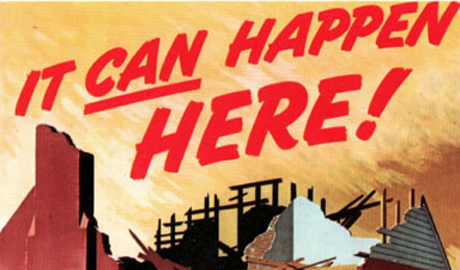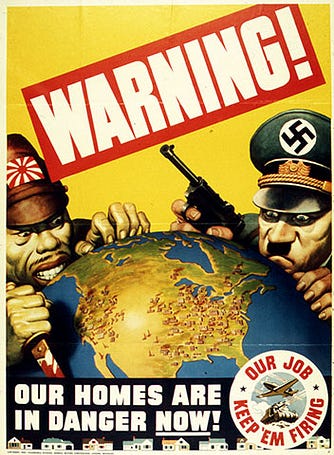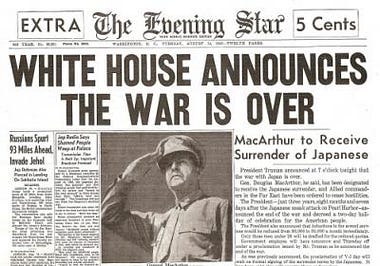
When the Japanese attacked Pearl Harbor in December, 1941, I was four years old. Some of my earliest memories are as an activist child during wartime. We had entered World War II and my job was as Chief Tin Can Inspector. I washed cans and crushed them flat. I bought Savings Stamps at school and pasted them into albums to convert into War Bonds.
The war was a constant backdrop and my parents were among millions who took the war effort seriously. The propaganda of the day was heavily into duty and obligation — every American citizen was called into service. We couldn’t allow one man, one regime, to win his war against humanity.
It marked us, and we were never the same. Our country grew more and more precious as the war years went on. The more lives that were lost protecting us, the more we persevered — for them. And when the war was over and we grew strong again, our pride grew even stronger. We did it! We won!
Generations of us grew up believing we had an obligation to our country. When JFK said, in his 1961 Inaugural Address, “Ask not what your country can do for you, ask what you can do for your country”, it wasn’t a demand, it was a reminder. This is what Americans do.
We’re in a different century now — 20 years into a different century — and if you cancel out the noise you’ll find the majority of Americans still believe in some sort of obligatory service. Our obligation is to keep our country strong, not by strong-arming the government, but by strengthening its core principles. By voting as if voting is a serious matter. By entering into public service, not as glory-seekers, but as true public servants. By working to ease the lives of those who are vulnerable and less fortunate. By recognizing that threats like global warming and raging pandemics are our burdens, our responsibility. Our survival is in our hands.
We are a nation of laws, of regulations, of justice and reckoning. We reject greed and corruption and frown on nepotism. We demand equality, we celebrate diversity, we recognize our enemies, both foreign and home-grown.
And if you’ve read this far, you’re probably wondering which rock I’ve just crawled out from under. This is not the America you’re seeing. Not even close.
But consider this:
Joe Biden, the Democratic presidential candidate, wasn’t even on the radar mere months ago. He was laughed at, vilified, virtually written off. He was ‘establishment’, an anachronism, an ancient workhorse destined to be put out to pasture. But, Rep. Jim Clyburn’s eloquent endorsement aside, maybe Biden’s victory was inevitable. Many of us listened to Clyburn’s call to decency, to obligation, to duty, and recognized his message as wholly, unequivocally American.
This is who we are. We are Americans, first and foremost.
We’ve made grievous mistakes and haven’t always been proud of our actions, but the promise of the United States is ‘to form a more perfect union’. Nothing has changed. We’re still working at it, but we can’t do it by going backward. We have to move forward, but we have to win first.
The past four years will be seen as an anomaly, an experiment gone horribly wrong. We’ll learn from it, but the price, the cost of hundreds of thousands of lives lost to a pandemic ravaging through our country, largely due to government incompetence, is far too high. The experimentation has to stop. It didn’t work. We have to get back to our promised obligation —to build a strong government designed to take care of our citizens.
We will come out of this. Joe Biden has begun gathering a phalanx of experts who are already working on programs and plans so they can start on Day One in January. (Cohorts and novices need not apply.) They’re going to need cheerleaders, and that’s where we come in.
The thing I remember most about my childhood during World War II is the optimism.
Were my parents afraid? They must have been terrified. They lived through the Great Depression only to watch Hitler’s Nazism spread throughout historic European strongholds. One man held entire countries hostage; he bent them and broke them. How could it happen?
Then Japan attacked Pearl Harbor, and suddenly it was hitting too close to home. Between a mandatory draft and a concerted need to protect our shores, millions of young men and women signed up to serve our country. Everything changed. And, except for the few predictable slackers, scam artists, and profiteers, we changed, too.
We became our country’s biggest allies. We retooled our factories, gave up luxuries, rationed necessities, pulled on our caring cloaks, found we cared deeply, and went to work as one country against a common enemy.
We did that. For more than four years we did that.
And let nobody ever tell you we can’t do it again.
_______________
(Cross-posted at Medium/Indelible Ink)













